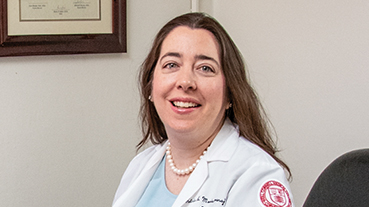Meeting the Pressing Need for Evidence-Based Obesity Care

Dr. Judith Korner
According to the Centers for Disease Control and Prevention, some 40 percent of Americans struggle with obesity. “The rising obesity rates over the past few decades are what one would normally see for an infectious disease and not necessarily a chronic condition like obesity,” says Judith Korner, MD, PhD, Director of the Weight Control Center at Columbia University Irving Medical Center. “We’re learning that one of the reasons for this is that human genetic makeup is geared towards preventing weight loss and storing fat in order to survive famine, reproduce, and maintain fertility. However, we don’t live in times of famine any longer. We don’t have to rely on killing the next woolly mammoth in order to feed our family. So, in this era of plenty, and not-so-healthy plenty, what used to protect us is what’s probably killing us now.”
Dr. Korner, a renowned expert in obesity and weight loss, founded the Weight Control Center in 2006 to address the need for patients to have their weight issues managed with compassion and accurately treated with evidence-based medicine. She and her team — Tirissa J. Reid, MD and Jamie Mullally, MD — are board-certified in endocrinology, diabetes, and metabolism and are certified by the American Board of Obesity Medicine (ABOM). Dr. Korner is Vice Chair of ABOM, and Dr. Reid serves on its Board of Directors.
Along with registered dietitian and certified diabetes educator Jamie Leskowitz, MD, RD, CDN, CDE, they offer strategies for weight loss and evaluate patients for weight-related health risks, such as insulin resistance, diabetes, Cushing’s disease and Cushing syndrome hypothyroidism, polycystic ovarian syndrome, high blood pressure, and elevated cholesterol. The team also screens for sleep disorders, for example, obstructive sleep apnea, that is common in individuals with excessive weight, and also addresses postmenopausal and postpartum weight management.
“We are trained to treat the patient in a supportive environment. There's no blame; we're just helping them to deal with this problem.”
— Dr. Judith Korner
The Center meets a pressing need for patients whose weight issues are frequently unmet by their primary care physicians. “People with obesity will go to their doctor, but most of the time their weight isn’t discussed,” says Dr. Korner. “Often the patient can’t be weighed because the scale doesn’t go above 350 pounds. And many physicians are not trained to help the obese patient.”
“We are trained to treat the patient in a supportive environment,” adds Dr. Korner. “There’s no blame; we’re just helping them to deal with this problem. We also look at the whole patient, starting with a comprehensive endocrinological evaluation to see if there are any medical reasons for the weight gain, including medications that may cause weight gain, as well as discuss factors that might make it more difficult for that patient to lose weight.”
“We also coordinate care across many medical and surgical disciplines, for example, individuals requiring weight loss prior to joint replacement surgery and those requiring weight loss in order to be listed for organ transplantation,” continues Dr. Korner. In addition to assisting patients in maintaining a healthy diet, the team provides guidance in increasing physical activity and offers stress management, mindfulness, and problem-solving therapy to help them cope with emotions that have led to weight gain in the past.
Studying Obesity from Many Perspectives
Research is a key component of the Weight Control Center. Dr. Korner is the principal investigator of an NIH-funded study to understand the hormonal regulation of appetite and energy balance. “One way we do this is by comparing the changes in hormones and other circulating proteins in people who lose weight by diet or by bariatric surgery,” says Dr. Korner. “If we can figure out why surgery is so effective, then new medical treatments may be discovered that could mimic the effects of surgery. When people lose weight with surgery, conditions like diabetes also improve. We’re trying to understand mechanisms other than just weight loss that drive the improvement in glucose regulation after surgery.” In collaboration with another member of the Endocrinology Division, Paul Harris, PhD, and one of the Endocrinology fellows, Rachel Arakawa, MD, a translational investigation underway is examining the role of dopamine metabolism in glucose tolerance. Based on evidence in mice, this study will address the hypothesis that modulation of gut dopamine production underlies some of the metabolic benefit of bariatric surgery.
In other investigations, the team is collaborating with Wendy K. Chung, MD, PhD, a clinical and molecular geneticist in the Columbia University Institute for Genomic Medicine. “We’re looking at people who have certain genetic mutations in pathways in the brain that regulate energy,” says Dr. Korner. “Some individuals who have these mutations may qualify for this potential hormonal therapy.” The researchers have also conducted a pilot study to determine whether the response to drug therapy for obesity is affected by allelic variation in the dopamine and opioid receptors. In a similar vein, there is an ongoing collaboration with Sharon Wardlaw, MD, a neuroendocrinologist who is studying biomarkers in cerebrospinal fluid that are associated with body weight and that may predict response to drug therapy for weight loss.
In addition, they have been working with Columbia cardiologist Angelo B. Biviano, MD, MPH, to determine the effect of weight loss on outcomes of treatments for atrial fibrillation. “We’ve also been talking with the gastroenterology and bariatric surgery groups at Columbia about potential endoscopic bariatric devices,” says Dr. Korner. “We used to think of smoking as being the leading cause of preventable, premature death, but now it is obesity. The best way is to try and prevent it, but the fact is that we have to treat it as well. And that’s what we’re trying to do.”
Related Publications





